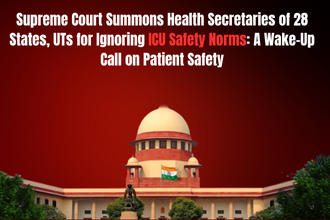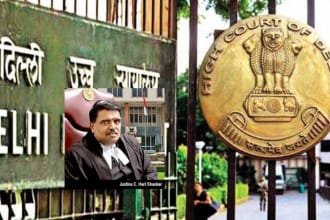New Delhi, October 15, 2025:
In a stern move to enforce accountability in healthcare administration, the Supreme Court of India has summoned the Health Secretaries or senior-most Health Department officials of 28 States and Union Territories (UTs) for failing to implement uniform standards for Intensive Care Units (ICUs) and Critical Care Units (CCUs).
The directive came from a Bench comprising Justices Ahsanuddin Amanullah and NK Singh, which expressed serious displeasure over what it termed as the “casual approach” of State authorities in complying with its repeated orders regarding patient safety in critical care facilities.
Background: From Negligence Complaint to Nationwide Oversight
The ongoing proceedings stem from the case Asit Baran Mondal & Anr. v. Dr. Rita Sinha & Ors., which initially began in 2016 as a complaint alleging medical negligence in private hospitals and the absence of uniform ICU standards across India.
Though the appeal was dismissed in 2024, the Supreme Court decided to continue monitoring the larger issue — highlighting its concern for systemic reform rather than isolated relief. Over the years, the Court has passed multiple orders urging both the Central Government and the States to collaborate on developing national ICU/CCU safety norms.
Court’s Strong Rebuke: No More Excuses
On October 13, 2025, the Court found that more than two dozen States and UTs had either failed to submit reports or had done so well past the deadline. Expressing deep dissatisfaction, the Bench said its patience had been tested.
“We are more pained than shocked by the casualness shown by various States, that despite over-indulgence shown by the Court, the orders have been taken very lightly by the officers concerned,” observed the Bench.
Accordingly, the Court issued show-cause notices to the Additional Chief Secretaries or senior-most Health Department officials of all defaulting States and UTs, directing them to appear in person on November 20, 2025, along with personally affirmed affidavits explaining their inaction.
The Bench made it clear that no excuses — including “prior engagements or other programs” — would be accepted.
States and UTs in Default
The long list of defaulting jurisdictions includes:
Arunachal Pradesh, Assam, Chhattisgarh, Goa, Gujarat, Himachal Pradesh, Jharkhand, Karnataka, Kerala, Madhya Pradesh, Maharashtra, Manipur, Mizoram, Odisha, Punjab, Rajasthan, Sikkim, Telangana, Tripura, West Bengal, Chandigarh, Delhi, Jammu & Kashmir, Puducherry, Lakshadweep, Ladakh, Andaman & Nicobar Islands, and Dadra & Nagar Haveli and Daman & Diu.
This wide-ranging non-compliance underscores a concerning nationwide gap in critical care regulation, despite years of judicial monitoring and policy guidance.
Earlier Directions and Missed Deadlines
In August 2025, the Supreme Court had instructed every State to hold stakeholder conferences involving public and private healthcare institutions to draft ICU and CCU safety norms. These were to include standards on admission protocols, staffing, treatment, hygiene, and infrastructure.
Each State was required to submit draft resolutions signed by its Health Secretary and send them to a three-member expert committee by October 5, 2025. The committee—comprising Additional Solicitor General Aishwarya Bhati, Amicus Curiae Karan Bharihoke, and Dr. Nitish Naik, Professor of Cardiology at AIIMS, New Delhi—was tasked with reviewing submissions and formulating a national framework for ICU safety.
However, during the hearing on October 13, the Court noted that most States had failed to comply despite prior extensions. On September 18, the Bench had already cautioned that further delays would invite “consequences.”
Judicial Oversight and Accountability
The Supreme Court’s decision to personally summon senior officers marks a rare exercise of judicial authority aimed at enforcing bureaucratic accountability. The order reflects the Court’s view that public health and patient safety are matters of constitutional importance under Article 21 (Right to Life) and cannot be left to administrative lethargy.
This approach mirrors similar past interventions, such as those concerning hospital fire safety, biomedical waste management, and oxygen supply during the COVID-19 pandemic.
Expert Committee’s Role: A Step Toward Uniform ICU Standards
Despite the States’ failures, the Court requested the expert committee to begin deliberations using the material already received. The Bench emphasized that the goal was not merely compliance but the creation of scientifically sound, implementable, and uniform national standards for critical care infrastructure.
Such standards are expected to cover key areas including:
- Minimum ICU bed-to-staff ratios
- Infection control and hygiene protocols
- Admission and discharge guidelines
- Equipment calibration and maintenance norms
- Emergency power and oxygen systems
- Transparency in billing and patient communication
Significance for India’s Healthcare System
India’s healthcare sector faces a critical shortage of ICU facilities — both in terms of quantity and quality. The lack of standardized safety norms leads to uneven care, high mortality, and cases of preventable medical errors.
By holding State officials accountable, the Supreme Court has effectively signaled that patient safety is a non-negotiable priority. The case could pave the way for the first national regulatory framework governing ICU and CCU operations, ensuring that life-saving facilities are safe, transparent, and properly staffed across both government and private hospitals.
Legal and Policy Implications
The Court’s intervention raises important legal questions about federal responsibility in healthcare regulation. While health is primarily a State subject under the Constitution, the Supreme Court’s continuing jurisdiction reflects the growing need for national consistency in healthcare standards — especially in life-critical domains like intensive care.
It also sets a precedent for judicially driven policy reform, where courts step in to enforce administrative efficiency when public welfare is at stake.
The Road Ahead: November 20 Hearing
The matter is next listed for November 20, 2025, when top health officials from all defaulting States and UTs will be required to appear in Court. The Bench is expected to review each State’s compliance affidavit and may consider imposing contempt proceedings or monetary penalties for continued negligence.
Observers believe this could be a defining moment in India’s push toward safer, more accountable healthcare systems.
Also Read
Supreme Court Allows Sale and Bursting of Green Firecrackers in Delhi-NCR During Diwali 2025



